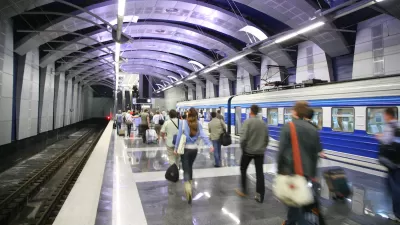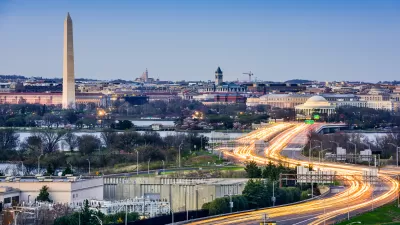An article for Next City reveals the transportation policy platforms of Ted Cruz, Donald Trump, Hillary Clinton, and Bernie Sanders, asking the question of whether any of them will shift new support to public transit.
Daniel McGraw reports on a talking point missing from the presidential campaign trail thus far: "As a country, we are in the middle of a radical shift in our relationship to the automobile and its role in transportation, and the current candidates aren’t speaking much to the change." After providing some evidence that more of the country is, in fact, ready to adopt a more multi-modal lifestyle, McGraw goes on to examine the transportation policy platform of each of the remaining candidates from the two major parties.
Starting with Senator Ted Cruz, McGraw notes that the Tea Party favorite has promised to kill funding for the New Starts Transit Program and has already voted against the FAST Act—the first multi-year transportation funding bill passed by Congress since 2005. By contract, Donald Trump has "expressed more than once what seems like jealousy of other countries’ 'super-speed trains'" and has stated, albeit vaguely, that the United States should spend more on mass transit.
McGraw finds more consistency on the side of the Democrats, noting that "both Clinton and Sanders think more spending on mass transit is needed…" According to McGraw, " Sanders wants to spend $1 trillion over five years on infrastructure, which will include mass transit improvements." And "Clinton wants to increase spending by $275 billion over five years" on roads, bridges, and transit. Sanders and Clinton differ, however, in how that money would be spent.
FULL STORY: Will Next U.S. President Be All Aboard for Public Transit?

Maui's Vacation Rental Debate Turns Ugly
Verbal attacks, misinformation campaigns and fistfights plague a high-stakes debate to convert thousands of vacation rentals into long-term housing.

Planetizen Federal Action Tracker
A weekly monitor of how Trump’s orders and actions are impacting planners and planning in America.

In Urban Planning, AI Prompting Could be the New Design Thinking
Creativity has long been key to great urban design. What if we see AI as our new creative partner?

King County Supportive Housing Program Offers Hope for Unhoused Residents
The county is taking a ‘Housing First’ approach that prioritizes getting people into housing, then offering wraparound supportive services.

Researchers Use AI to Get Clearer Picture of US Housing
Analysts are using artificial intelligence to supercharge their research by allowing them to comb through data faster. Though these AI tools can be error prone, they save time and housing researchers are optimistic about the future.

Making Shared Micromobility More Inclusive
Cities and shared mobility system operators can do more to include people with disabilities in planning and operations, per a new report.
Urban Design for Planners 1: Software Tools
This six-course series explores essential urban design concepts using open source software and equips planners with the tools they need to participate fully in the urban design process.
Planning for Universal Design
Learn the tools for implementing Universal Design in planning regulations.
planning NEXT
Appalachian Highlands Housing Partners
Mpact (founded as Rail~Volution)
City of Camden Redevelopment Agency
City of Astoria
City of Portland
City of Laramie




























